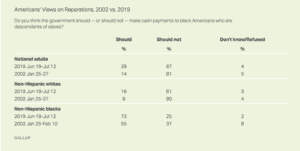As Redress for Slavery, Americans Oppose Cash Reparations
Mohamed Younis, Gallup, July 29, 2019
{snip} While reparations could take many forms, the most straightforward would be cash payments by the government to descendants of American slaves. Most Americans (67%) say the government should not make such payments, but 29% say it should, including the solid majority of black Americans (73%).
In contrast to blacks’ support for reparations, 16% of non-Hispanic white Americans say the government should make such payments to Americans who are the descendants of slaves.

While the current 29% support among all Americans is low in absolute terms, more support the idea of reparations today than did so in 2002, when 14% were in favor as the subject was making news. Since then, support is up slightly among whites, from 6% to 16%, while it has increased more dramatically among blacks — from a simple majority in 2002 to nearly three-quarters today.
{snip}
Democrats Split on Reparations
{snip} Currently, 49% of Democrats say the government should make such payments; 47% say it should not. Still, Democratic support is up from 25% in 2002, so there is momentum for reparations in the party. Support has also increased among independents, from 15% in 2002 to 32% today. Meanwhile, there is minimal support among Republicans, with 5% in favor and 92% opposed. And this hasn’t changed since 2002, when 4% were in favor.
{snip}
Implications
Last year was the first in nearly two decades of Gallup polling on the topic to see most black Americans describe black-white relations as “bad.” As race relations, racial disparities and perceptions of discrimination play a more central role in American national politics, some leaders on the left have proposed revisiting the issue of reparations for Americans who are the descendants of slaves. While there may be serious disagreement between racial groups and even among Democrats on the efficacy of government-initiated cash payments, Republicans are nearly unanimous in their opposition to such a policy. {snip}















